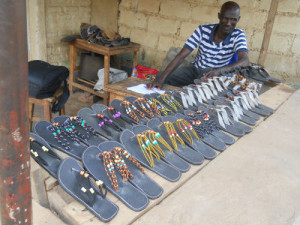Walking on good intentions is like walking on clouds: it sounds beautiful in theory, but lacks enough substance to support true progress. Good intentions lack the practicality that encourages individuals to seek tangible opportunities for change. This type of change starts from the roots and slowly climbs towards the surface. As a globally engaged campus, social justice issues are at the forefront of Houghton students’ minds. As college students, are there practical ways for action to transcend mere intention? Chris Way, class of 2012 offers an application for this query. The application is enhanced by an abstract cognitive exercise in human relationship that aids in the physical incarnation of development strategies. Way and Princess Nabintu Kabaya began a collaborative work called The Atinga Project. Way works with a team of artisans who create sandals made from repurposed tires. The simple, durable design is not only a resilient shoe, but also a powerful metaphor for Christ-centered relationships. The three core values of the Atinga project: dignity, honor, and humility give diverse meaning to this metaphor.
 This three-dimensional value statement applies to many forms. For example, the dignity of artisans is protected when a fair wage is received for the product. Junior International development major, Emily Barry, interned with the Atinga project this past summer as a communications and social media representative. In her work, she conducted research on the average Rwandan salary as published by the World Bank compared to an artisan employed in fair wage artisanship. She found that fair trade artisans make more per year than the average Rwandan. This is one way of directly restoring economic dignity. For this reason, buying fair trade is crucial for restoring dignity to the individual artist and to the art form. According to Barry, fair trade is saying, “I’m doing something, I’m doing it responsibly, and we’re doing it together.” Supply and demand then becomes a collaborative effort of human relationship on an international scale.
This three-dimensional value statement applies to many forms. For example, the dignity of artisans is protected when a fair wage is received for the product. Junior International development major, Emily Barry, interned with the Atinga project this past summer as a communications and social media representative. In her work, she conducted research on the average Rwandan salary as published by the World Bank compared to an artisan employed in fair wage artisanship. She found that fair trade artisans make more per year than the average Rwandan. This is one way of directly restoring economic dignity. For this reason, buying fair trade is crucial for restoring dignity to the individual artist and to the art form. According to Barry, fair trade is saying, “I’m doing something, I’m doing it responsibly, and we’re doing it together.” Supply and demand then becomes a collaborative effort of human relationship on an international scale.
Furthermore, artisans honor and protect the environment by recycling a product that might otherwise prove harmful for the atmosphere. Tire waste emits toxins and attracts unwanted pests. As the international demand for Atinga sandals increases, potentially harmful waste has a reliable means of re-entry into a productive market.
Contributors to the global market engage in a mutual learning relationship because of this exchange of goods and ideas. But sometimes “mutual empowerment” and “mutual learning” according to Barry, are romanticized on a global scale. However, These are more challenging ideas when applied to individual relationships. To embrace the Atinga Project slogan, “Walk a Mile in Their Shoes” is to walk in close connection with the people we encounter everyday. With this slogan, Way encourages Houghton students to “listen with love” as everyday opportunities to learn and grow with fellow classmates present themselves. To listen with love is a response to the Biblical mandate of Proverbs 12:15 to “Rejoice with those who rejoice; mourn with those who mourn.” Consumerism can no longer be about an economic transaction.
Part of the Atinga mission is to walk alongside someone with a humble attitude in order to listen to the needs of another person. The mission is to acknowledge that behind every headline there are individual stories. With global and local interactions, relating to others in a dignifying, honoring, and humbling way gives motion back to the wheel in its reconstructed state.
If you are interested in learning more about the Atinga Project, please visit atingaproject.com or check out their display in the campus store.
